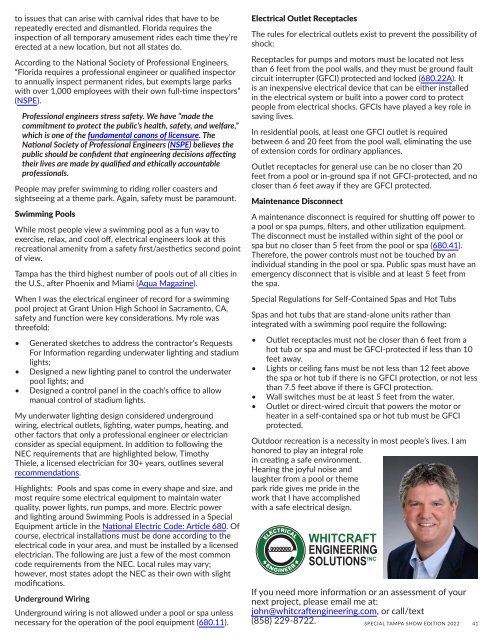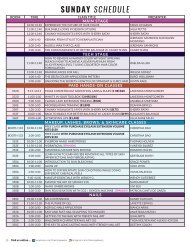Construction Monthly Magazine |Tampa 2022 Build Expo Show Edition
You also want an ePaper? Increase the reach of your titles
YUMPU automatically turns print PDFs into web optimized ePapers that Google loves.
to issues that can arise with carnival rides that have to be<br />
repeatedly erected and dismantled. Florida requires the<br />
inspection of all temporary amusement rides each time they’re<br />
erected at a new location, but not all states do.<br />
According to the National Society of Professional Engineers,<br />
“Florida requires a professional engineer or qualified inspector<br />
to annually inspect permanent rides, but exempts large parks<br />
with over 1,000 employees with their own full-time inspectors”<br />
(NSPE).<br />
Professional engineers stress safety. We have “made the<br />
commitment to protect the public’s health, safety, and welfare,”<br />
which is one of the fundamental canons of licensure. The<br />
National Society of Professional Engineers (NSPE) believes the<br />
public should be confident that engineering decisions affecting<br />
their lives are made by qualified and ethically accountable<br />
professionals.<br />
People may prefer swimming to riding roller coasters and<br />
sightseeing at a theme park. Again, safety must be paramount.<br />
Swimming Pools<br />
While most people view a swimming pool as a fun way to<br />
exercise, relax, and cool off, electrical engineers look at this<br />
recreational amenity from a safety first/aesthetics second point<br />
of view.<br />
Tampa has the third highest number of pools out of all cities in<br />
the U.S., after Phoenix and Miami (Aqua <strong>Magazine</strong>).<br />
When I was the electrical engineer of record for a swimming<br />
pool project at Grant Union High School in Sacramento, CA,<br />
safety and function were key considerations. My role was<br />
threefold:<br />
• Generated sketches to address the contractor’s Requests<br />
For Information regarding underwater lighting and stadium<br />
lights;<br />
• Designed a new lighting panel to control the underwater<br />
pool lights; and<br />
• Designed a control panel in the coach’s office to allow<br />
manual control of stadium lights.<br />
My underwater lighting design considered underground<br />
wiring, electrical outlets, lighting, water pumps, heating, and<br />
other factors that only a professional engineer or electrician<br />
consider as special equipment. In addition to following the<br />
NEC requirements that are highlighted below, Timothy<br />
Thiele, a licensed electrician for 30+ years, outlines several<br />
recommendations.<br />
Highlights: Pools and spas come in every shape and size, and<br />
most require some electrical equipment to maintain water<br />
quality, power lights, run pumps, and more. Electric power<br />
and lighting around Swimming Pools is addressed in a Special<br />
Equipment article in the National Electric Code: Article 680. Of<br />
course, electrical installations must be done according to the<br />
electrical code in your area, and must be installed by a licensed<br />
electrician. The following are just a few of the most common<br />
code requirements from the NEC. Local rules may vary;<br />
however, most states adopt the NEC as their own with slight<br />
modifications.<br />
Underground Wiring<br />
Underground wiring is not allowed under a pool or spa unless<br />
necessary for the operation of the pool equipment (680.11).<br />
Electrical Outlet Receptacles<br />
The rules for electrical outlets exist to prevent the possibility of<br />
shock:<br />
Receptacles for pumps and motors must be located not less<br />
than 6 feet from the pool walls, and they must be ground fault<br />
circuit interrupter (GFCI) protected and locked (680.22A). It<br />
is an inexpensive electrical device that can be either installed<br />
in the electrical system or built into a power cord to protect<br />
people from electrical shocks. GFCIs have played a key role in<br />
saving lives.<br />
In residential pools, at least one GFCI outlet is required<br />
between 6 and 20 feet from the pool wall, eliminating the use<br />
of extension cords for ordinary appliances.<br />
Outlet receptacles for general use can be no closer than 20<br />
feet from a pool or in-ground spa if not GFCI-protected, and no<br />
closer than 6 feet away if they are GFCI protected.<br />
Maintenance Disconnect<br />
A maintenance disconnect is required for shutting off power to<br />
a pool or spa pumps, filters, and other utilization equipment.<br />
The disconnect must be installed within sight of the pool or<br />
spa but no closer than 5 feet from the pool or spa (680.41).<br />
Therefore, the power controls must not be touched by an<br />
individual standing in the pool or spa. Public spas must have an<br />
emergency disconnect that is visible and at least 5 feet from<br />
the spa.<br />
Special Regulations for Self-Contained Spas and Hot Tubs<br />
Spas and hot tubs that are stand-alone units rather than<br />
integrated with a swimming pool require the following:<br />
• Outlet receptacles must not be closer than 6 feet from a<br />
hot tub or spa and must be GFCI-protected if less than 10<br />
feet away.<br />
• Lights or ceiling fans must be not less than 12 feet above<br />
the spa or hot tub if there is no GFCI protection, or not less<br />
than 7.5 feet above if there is GFCI protection.<br />
• Wall switches must be at least 5 feet from the water.<br />
• Outlet or direct-wired circuit that powers the motor or<br />
heater in a self-contained spa or hot tub must be GFCI<br />
protected.<br />
Outdoor recreation is a necessity in most people’s lives. I am<br />
honored to play an integral role<br />
in creating a safe environment.<br />
Hearing the joyful noise and<br />
laughter from a pool or theme<br />
park ride gives me pride in the<br />
work that I have accomplished<br />
with a safe electrical design.<br />
If you need more information or an assessment of your<br />
next project, please email me at:<br />
john@whitcraftengineering.com, or call/text<br />
(858) 229-8722.<br />
SPECIAL TAMPA SHOW EDITION <strong>2022</strong> 41

















